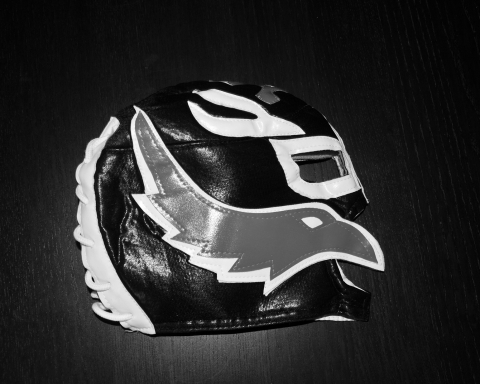foreword
Act Up, a queer panafricanist journey
On February 5, 1979, a coup d'état took place in Congo-Brazzaville. The man with whom my mother had lived since 1970, General Joaquim Yhomby-Opango, was overthrown. My brother, sister and I were in France at the time. My mother took refuge in Kinshasa (Zaïre) with her father's family. Afterwards, we lived between Kinshasa and Paris. My mother started her life again in 1982, with Thy René Essolomwa Nkoy Ea Linganga, the director and founder of the newspaper Elima. Since 1973, it was one of the two daily newspapers authorized by Mobutu Sese Seko, the other being the newspaper Salongo. He who became my adoptive father was a close friend of the president of the former Zaire (1965-1997), until their public falling-out at the end of the 1980s.
In 1983, while on vacation in Kinshasa, he announced to the family that the country was experiencing a health crisis that was being hidden from the population. The disease was AIDS, caused by the human immunodeficiency virus (HIV), which had just been discovered by the French teams of professors Montagnier and Barré-Sinoussi of the Pasteur Institute in Paris. I had already heard about this disease on French television. It was said to be the disease of homosexuals and Blacks. It was also called "Gay Cancer". As a teenager, I was immediately concerned, even though it was still abstract. We were among the few families who knew about what was happening in the country. The silence and invisibility of this mysterious disease, and the contempt it engenders, will have a huge impact on the lives of people, not only in Zaire but throughout the African continent and the rest of the world. We are witnessing the cruel manifestation of the injustice of inequalities between those who have access to information and those who do not. Information = Power.
It was not until the end of 1985 that information began to circulate. As reported in the newspaper Le Monde : “The evil is spreading,” reads the newspaper Elima, “and it is no longer just attacking Westerners. Even poor people in developing countries are forced to face it.” Some statistics on cases in Africa are given, and company newsletters begin to inform their readers about the reality of the disease. It was only in June 1986, at the second international conference on AIDS in Paris, that Dr. Kapita M. Bila, without the authorization of the Zairean authorities, gave a precise account of the situation in Africa and particularly in Zaire. “Six out of every hundred Africans are infected with the AIDS virus.” Kinshasa is promoted by the Time as the "AIDS capital of the world". It took the courage of this Zairean doctor from Mama-Yemo General Hospital in Kinshasa for us to finally get an idea of the extent of the epidemic in Africa. In July 1984, he had already provided the preliminary results of a 1983 study on blood samples collected by the Mama Yemo AIDS project. As early as 1975, Dr. Bila was seeing patients with AIDS symptoms in the hospital. His team's clinical trials were published in the scientific journal The Lancet. The article demonstrated the transmission of AIDS between heterosexual partners – a world first. Before finding an audience in The Lancet, the New England Journal of Medicine rejected the findings on the grounds that heterosexual transmission was impossible. In April 1985, members of the AIDS project, including Dr. Kapita M. Bila, Nzila Nzilambi, Jonathan Mann and Peter Piot, as well as Dr. Pangu Kaza Asila of the Zairean Ministry of Health and Dr. Wobin Odio of the University of Kinshasa, attended the first international conference on AIDS in Atlanta. There, white US scientists made racist links between African sexuality and HIV transmission. This was not be the last time racism was expressed. After 1996, other racist statements were also made by US officials, especially when it came to blocking access to antiretroviral drugs for African populations. Racism = Death
For my part, the process of awareness launched in 1983 led to my active involvement from 1988. Personal events were to intervene and influence me greatly. During the summer of that year, I learned that I was going to become a father. I had a brief relationship with Patricia, a friend, and we did not use protection. I was so aware of the risks of AIDS that I fell into the trap of denial. My shame at being homosexual pushed me to want to prove to those around me that I was heterosexual by having this affair. I am brutally aware of the dangers to which I exposed myself, only pushed by family and social pressure and the human need to be accepted by others. What if, in addition to a future birth, I had contracted or transmitted HIV? A lot of questions would obsess me afterwards. At the time, there was no treatment, AIDS was a death sentence. This is still the case today, especially in Africa, for the millions of people who do not have access to medication due to a lack of funding, but especially due to a lack of political will. Members of my family were HIV-positive and had AIDS. Some of my mother's employees were also sick. I decided to get involved but without imagining that it would become the fight of my life. As a young adult, I was interested in agriculture and food sovereignty issues in Africa, like my heroes, the Congolese agronomist and nationalist, Paul Panda Farnana, and the Guinea-Bissauan and Cabo Verdean revolutionary, Amilcar Cabral. What I have understood above all is to pursue my own dreams and make my choices respected. Action = Life
Back in France in the 1990s, I was watching the second edition of Sidaction in 1996. Christophe Martet, the president of the anti-AIDS association Act Up-Paris, confronted the minister of culture, Philippe Douste-Blazy, to oppose the deportation of sick and HIV-positive foreigners, calling France "a shit country". I support that anger and strong stand. I decided to join Act Up-Paris. I have always been convinced that we must unite our efforts and show solidarity in order to provide a global response, and recognize the humanity of each and every one of us. This is the only way to really fight AIDS or any other pandemic. The fight against dehumanization that Act Up is leading will be mine. But before I join the movement, I have to treat myself. I have a severe form of a rare systemic disease that my doctors can't diagnose. It will be a long time before I find out that it is sarcoidosis and get treatment. The side effects of the treatment will leave me disabled. I will have to undergo many surgeries. But, three months after my release from the hospital, I joined Act Up-Paris on 24 June 2000, and I will stay there for 10 years. Act Up = Pride
It wasn't until I started the photographic story "Minorities" in 2010 that I could finally talk about my journey, with the following questions in mind: Who am I? Where do I come from? Where am I speaking from? And where am I going? And, beyond my small personal story, to tell, from a situated point of view, the great collective story, that of the fight against AIDS since the beginning of the 20th century, and that of homosexuals and sexual and gender minorities since the entry of humanity into the modern era, at the end of the 15th century. To collectively reclaim the narrative, and fight against the historical disregard of our social and political contributions, as well as the denial of justice for our lives. My activism and outrage will have resulted in a vocation to advocate against dehumanization through art and culture. To transmit knowledge, to rediscover past voices and to make those of tomorrow resonate. To make the production of situated knowledge and the transmission of memory the tools of empowerment and agency. Silence = Death.
On February 5, 1979, a coup d'état took place in Congo-Brazzaville. The man with whom my mother had lived since 1970, General Joaquim Yhomby-Opango, was overthrown. My brother, sister and I were in France at the time. My mother took refuge in Kinshasa (Zaïre) with her father's family. Afterwards, we lived between Kinshasa and Paris. My mother started her life again in 1982, with Thy René Essolomwa Nkoy Ea Linganga, the director and founder of the newspaper Elima. Since 1973, it was one of the two daily newspapers authorized by Mobutu Sese Seko, the other being the newspaper Salongo. He who became my adoptive father was a close friend of the president of the former Zaire (1965-1997), until their public falling-out at the end of the 1980s.
In 1983, while on vacation in Kinshasa, he announced to the family that the country was experiencing a health crisis that was being hidden from the population. The disease was AIDS, caused by the human immunodeficiency virus (HIV), which had just been discovered by the French teams of professors Montagnier and Barré-Sinoussi of the Pasteur Institute in Paris. I had already heard about this disease on French television. It was said to be the disease of homosexuals and Blacks. It was also called "Gay Cancer". As a teenager, I was immediately concerned, even though it was still abstract. We were among the few families who knew about what was happening in the country. The silence and invisibility of this mysterious disease, and the contempt it engenders, will have a huge impact on the lives of people, not only in Zaire but throughout the African continent and the rest of the world. We are witnessing the cruel manifestation of the injustice of inequalities between those who have access to information and those who do not. Information = Power.
It was not until the end of 1985 that information began to circulate. As reported in the newspaper Le Monde : “The evil is spreading,” reads the newspaper Elima, “and it is no longer just attacking Westerners. Even poor people in developing countries are forced to face it.” Some statistics on cases in Africa are given, and company newsletters begin to inform their readers about the reality of the disease. It was only in June 1986, at the second international conference on AIDS in Paris, that Dr. Kapita M. Bila, without the authorization of the Zairean authorities, gave a precise account of the situation in Africa and particularly in Zaire. “Six out of every hundred Africans are infected with the AIDS virus.” Kinshasa is promoted by the Time as the "AIDS capital of the world". It took the courage of this Zairean doctor from Mama-Yemo General Hospital in Kinshasa for us to finally get an idea of the extent of the epidemic in Africa. In July 1984, he had already provided the preliminary results of a 1983 study on blood samples collected by the Mama Yemo AIDS project. As early as 1975, Dr. Bila was seeing patients with AIDS symptoms in the hospital. His team's clinical trials were published in the scientific journal The Lancet. The article demonstrated the transmission of AIDS between heterosexual partners – a world first. Before finding an audience in The Lancet, the New England Journal of Medicine rejected the findings on the grounds that heterosexual transmission was impossible. In April 1985, members of the AIDS project, including Dr. Kapita M. Bila, Nzila Nzilambi, Jonathan Mann and Peter Piot, as well as Dr. Pangu Kaza Asila of the Zairean Ministry of Health and Dr. Wobin Odio of the University of Kinshasa, attended the first international conference on AIDS in Atlanta. There, white US scientists made racist links between African sexuality and HIV transmission. This was not be the last time racism was expressed. After 1996, other racist statements were also made by US officials, especially when it came to blocking access to antiretroviral drugs for African populations. Racism = Death
For my part, the process of awareness launched in 1983 led to my active involvement from 1988. Personal events were to intervene and influence me greatly. During the summer of that year, I learned that I was going to become a father. I had a brief relationship with Patricia, a friend, and we did not use protection. I was so aware of the risks of AIDS that I fell into the trap of denial. My shame at being homosexual pushed me to want to prove to those around me that I was heterosexual by having this affair. I am brutally aware of the dangers to which I exposed myself, only pushed by family and social pressure and the human need to be accepted by others. What if, in addition to a future birth, I had contracted or transmitted HIV? A lot of questions would obsess me afterwards. At the time, there was no treatment, AIDS was a death sentence. This is still the case today, especially in Africa, for the millions of people who do not have access to medication due to a lack of funding, but especially due to a lack of political will. Members of my family were HIV-positive and had AIDS. Some of my mother's employees were also sick. I decided to get involved but without imagining that it would become the fight of my life. As a young adult, I was interested in agriculture and food sovereignty issues in Africa, like my heroes, the Congolese agronomist and nationalist, Paul Panda Farnana, and the Guinea-Bissauan and Cabo Verdean revolutionary, Amilcar Cabral. What I have understood above all is to pursue my own dreams and make my choices respected. Action = Life
Back in France in the 1990s, I was watching the second edition of Sidaction in 1996. Christophe Martet, the president of the anti-AIDS association Act Up-Paris, confronted the minister of culture, Philippe Douste-Blazy, to oppose the deportation of sick and HIV-positive foreigners, calling France "a shit country". I support that anger and strong stand. I decided to join Act Up-Paris. I have always been convinced that we must unite our efforts and show solidarity in order to provide a global response, and recognize the humanity of each and every one of us. This is the only way to really fight AIDS or any other pandemic. The fight against dehumanization that Act Up is leading will be mine. But before I join the movement, I have to treat myself. I have a severe form of a rare systemic disease that my doctors can't diagnose. It will be a long time before I find out that it is sarcoidosis and get treatment. The side effects of the treatment will leave me disabled. I will have to undergo many surgeries. But, three months after my release from the hospital, I joined Act Up-Paris on 24 June 2000, and I will stay there for 10 years. Act Up = Pride
It wasn't until I started the photographic story "Minorities" in 2010 that I could finally talk about my journey, with the following questions in mind: Who am I? Where do I come from? Where am I speaking from? And where am I going? And, beyond my small personal story, to tell, from a situated point of view, the great collective story, that of the fight against AIDS since the beginning of the 20th century, and that of homosexuals and sexual and gender minorities since the entry of humanity into the modern era, at the end of the 15th century. To collectively reclaim the narrative, and fight against the historical disregard of our social and political contributions, as well as the denial of justice for our lives. My activism and outrage will have resulted in a vocation to advocate against dehumanization through art and culture. To transmit knowledge, to rediscover past voices and to make those of tomorrow resonate. To make the production of situated knowledge and the transmission of memory the tools of empowerment and agency. Silence = Death.


